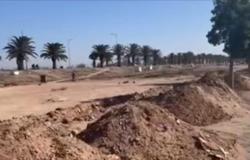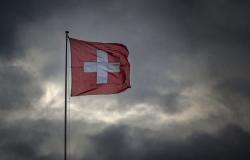Seok Dong-hyeon (C), spokesperson for impeached South Korean President Yoon Suk Yeol’s legal team, speaks during a news briefing at his office in Seoul, December 19, 2024. The team South Korea’s deposed president’s legal adviser argued Dec. 19 that Yoon Suk Yeol did not commit insurrection during his dramatic imposition of martial law this month. (Photo by Jung Yeon-je / AFP)
AFP
Mr. Yoon spoke for 40 minutes in court, the Yonhap news agency reported, his lawyer having previously told AFP that the leader hoped to “restore his honor” before the judges.
Mr. Yoon “explained and answered truthfully on the facts, evidence and legal issues,” his lawyer Yoon Kab-keun told reporters after the hearing.
The court must now decide whether to release Mr. Yoon, which analysts say is unlikely, or extend his detention for another twenty days. His decision is expected late Saturday or early Sunday.
Outside the court, AFP journalists saw crowds of Mr. Yoon’s supporters – 12,000, according to police cited by Yonhap – brandishing signs reading “free the president”.
Sixteen demonstrators were arrested by the police after trying to force their way into the courthouse, AFP journalists noted.
The hearing ended after about five hours around 6:50 p.m. local time (09:50 GMT), a court official told AFP.
Mr. Yoon left the court in a blue Justice Ministry van heading to the Seoul detention center where he is being held.
Thousands of supporters cheered and shouted as the vehicle left the court grounds in a convoy provided by presidential security.
On Friday, Mr. Yoon sent a letter through his lawyers thanking his supporters, who include evangelical Christians and right-wing YouTubers, for their protests, emphasizing their “passionate patriotism.”
On Saturday, protesters, waving South Korean and American flags, occupied the main roads in front of the court.
Mr. Yoon’s party generally favors the U.S. security alliance with South Korea and rejects any engagement with nuclear-armed North Korea.
-“The likelihood of the court approving the arrest is very high, and aware of this, Yoon called for maximum mobilization among his hardliners,” Chae Jin-won of Humanitas College in Beijing told AFP. Kyung Hee University.
“Today’s protests, he said, constitute a sort of farewell between Yoon and his extreme support base.”
A court decision approving Mr. Yoon’s continued detention would give prosecutors time to formalize an insurrection indictment, punishable by life in prison or execution if convicted.
Such a charge would mean Mr. Yoon would likely be detained for the duration of his trial.
Once “the arrest warrant is issued this time, (Yoon) will probably not be able to return home for an extended period of time,” political analyst Park Sang-byung told AFP.
Failure to extend his detention would, on the contrary, result in his release.
Mr. Yoon is accused of having destabilized the country by declaring martial law by surprise on December 3, a coup however quickly thwarted by the deputies, within a Parliament surrounded by soldiers.
He had justified the establishment of martial law as a measure intended to protect South Korea from “North Korean communist forces” and to “eliminate elements hostile to the state”.
He was arrested on January 15 after a six-hour assault by anti-corruption investigators and police on his official residence, a first in South Korea for a sitting head of state.
Declaring that he had agreed to leave his complex to avoid “bloodshed”, he clarified that he did not recognize the legality of the investigation.
The National Assembly adopted an impeachment motion against him on December 14, causing his suspension. However, he officially remains the president, with only the Constitutional Court having the power to strip him of his title.
In this procedure parallel to the ongoing investigations, the court has until mid-June to permanently dismiss him, or decide to reinstate him in his functions.





